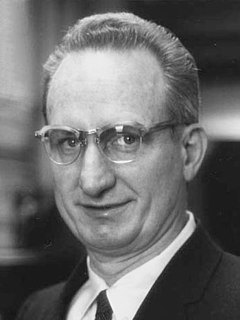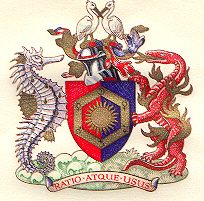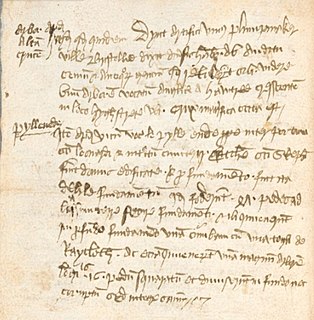The William James Society (WJS) is an interdisciplinary professional society which supports the study of the life and work of American psychologist and philosopher William James. The organization was founded in 1999. For several years, the WJS published a newsletter named Streams of William James. Since 2006, the society has published the peer reviewed academic online journal William James Studies.

The New General Catalogue of Nebulae and Clusters of Stars is an astronomical catalogue of deep-sky objects compiled by John Louis Emil Dreyer in 1888. The NGC contains 7,840 objects, including galaxies, star clusters, emission nebulae and absorption nebulae. Dreyer published two supplements to the NGC in 1895 and 1908, known as the Index Catalogues, describing a further 5,386 astronomical objects. Thousands of these objects are best known by their NGC or IC numbers, which remain in widespread use.

Pragmatism is a philosophical tradition that considers words and thought as tools and instruments for prediction, problem solving, and action, and rejects the idea that the function of thought is to describe, represent, or mirror reality. Pragmatists contend that most philosophical topics—such as the nature of knowledge, language, concepts, meaning, belief, and science—are all best viewed in terms of their practical uses and successes.

John Playfair FRSE, FRS was a Church of Scotland minister, remembered as a scientist and mathematician, and a professor of natural philosophy at the University of Edinburgh. He is best known for his book Illustrations of the Huttonian Theory of the Earth (1802), which summarised the work of James Hutton. It was through this book that Hutton's principle of uniformitarianism, later taken up by Charles Lyell, first reached a wide audience. Playfair's textbook Elements of Geometry made a brief expression of Euclid's parallel postulate known now as Playfair's axiom.

The American Philosophical Society (APS), founded in 1743 in Philadelphia, is a scholarly organization that promotes knowledge in the sciences and humanities through research, professional meetings, publications, library resources, and community outreach. Considered the first learned society in the United States, it has about 1,000 elected members, and by April 2020 had had only 5,710 members since its creation. Through research grants, published journals, the American Philosophical Society Museum, an extensive library, and regular meetings, the society supports a variety of disciplines in the humanities and the sciences.

James Parkinson FGS was an English surgeon, apothecary, geologist, palaeontologist and political activist. He is best known for his 1817 work An Essay on the Shaking Palsy, in which he was the first to describe "paralysis agitans", a condition that would later be renamed Parkinson's disease by Jean-Martin Charcot.

The Geological Society of London, known commonly as the Geological Society, is a learned society based in the United Kingdom. It is the oldest national geological society in the world and the largest in Europe with more than 12,000 Fellows.

Leo James Rainwater was an American physicist who shared the Nobel Prize in Physics in 1975 for his part in determining the asymmetrical shapes of certain atomic nuclei.

The American Historical Association (AHA) is the oldest professional association of historians in the United States and the largest such organization in the world. Founded in 1884, the AHA provides leadership for the discipline by protecting academic freedom, developing professional standards, supporting scholarship and innovative teaching, and helping to sustain and enhance the work of historians. It publishes The American Historical Review four times a year, with scholarly articles and book reviews. The AHA is the major organization for historians working in the United States, while the Organization of American Historians is the major organization for historians who study and teach about the United States.

The Royal Institute of Chemistry was a British scientific organisation. Founded in 1877 as the Institute of Chemistry of Great Britain, its role was to focus on qualifications and the professional status of chemists, and its aim was to ensure that consulting and analytical chemists were properly trained and qualified. It awarded qualifications: AIC indicating full training, and FIC (fellow) indicating professional competence.

John Snow was an English physician and a leader in the development of anaesthesia and medical hygiene. He is considered one of the founders of modern epidemiology, in part because of his work in tracing the source of a cholera outbreak in Soho, London, in 1854, which he curtailed by removing the handle of a water pump. Snow's findings inspired the adoption of anaesthesia as well as fundamental changes in the water and waste systems of London, which led to similar changes in other cities, and a significant improvement in general public health around the world.

The American Academy of Religion (AAR) is the world's largest association of scholars in the field of religious studies and related topics. It is a nonprofit member association, serving as a professional and learned society for scholars involved in the academic study of religion. It has some 10,000 members worldwide, with the largest concentration being in the United States and Canada. AAR members are university and college professors, independent scholars, secondary teachers, clergy, seminarians, students, and interested lay-people.
Events from the year 1890 in Ireland.

William Worcester, also called William of Worcester, William Worcestre or William Botoner was an English topographer, antiquary and chronicler.

The New English Art Club (NEAC) was founded in London in 1885 as an alternative venue to the Royal Academy. It continues to hold an annual exhibition of paintings and drawings at the Mall Galleries in London, exhibiting works by both members and artists from Britain and abroad whose work has been selected from an annual open submission.

The Royal Entomological Society is devoted to the study of insects. Its aims are to disseminate information about insects and improving communication between entomologists.
The Society of Biblical Literature (SBL), founded in 1880 as the Society of Biblical Literature and Exegesis, is an American-based learned society dedicated to the academic study of the Bible and related ancient literature. Its current stated mission is to "foster biblical scholarship". Membership is open to the public and consists of over 8,300 individuals from over 100 countries. As a scholarly organization, SBL has been a constituent society of the American Council of Learned Societies since 1929.

William Hope was a pioneer of so-called "spirit photography". Based in Crewe, England, he was a member of the well known spiritualists group, the Crewe Circle. He died in Salford hospital on 8 March 1933.

The British Mycological Society is a learned society established in 1896 to promote the study of fungi.
Events from the year 1823 in Scotland.
WJS may refer to: